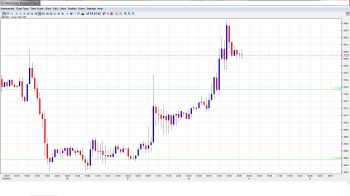GBP/USD showed some volatility this week, but managed to gain almost a full cent after rallying late in the week. The pair closed just under the 1.58 line, at 1.5795. This week’s major events include CPI and Retail Sales. Here is an outlook of the events and an updated technical analysis for GBP/USD.
There were no surprises last week from the BOE, as it maintained QE and interest rate levels. The pound got a boost late in the week as the NIESR GDP Estimate climbed out of negative territory, with a 0.0% reading. As well, US Trade Balance numbers improved, raising hopes that the US economy is headed in the right direction.
Updates: RICS House Price Balance dropped 4%, well below the estimate of 0%. The housing indicator has not posted a gain since July 2010. CB Leading Index recorded a modest gain of 0.1%. The UK released a host of inflation data on Tuesday. CPI, a key index, rose 2.7%, exactly as forecast. PPI Input climbed 1.3%, beating the estimate of 0.9%. RPI jumped 3.3%, just above the estimate of 3.2%. Core CPI rose 2.3%, a drop below the estimate of 2.4%. HPI looked sharp, posting a gain of 3.3%. This easily exceeded the forecast of 2.1%. PPI Output rose 0.2%, matching the estimate. GBP/USD is testing the 1.56 line, as the pair was trading at 1.5596. The pound continues to slump, and a negative BOE Inflation report only made things worse for the currency. The BOE stated the economy is “flat”, and will only recover to pre-crisis levels in 2015. The BOE does not expect the government to reach its inflation target until that time, due to the economy’s weakness. The pound has now dropped below the 1.55 line, as GBP/USD was trading at 1.5487.
GBP/USD graph with support and resistance lines on it. Click to enlarge:
- RICS House Price Balance: Tuesday, 00:01. This indicator has looked weak for quite some time, and has not posted a gain since 2010. However, the indicator did reach 0.0% in the January reading. The estimate for February remains the same, and the markets will be be delighted if the indicator can break into positive territory.
- CPI: Tuesday, 9:30. The UK is releasing a host of inflation indicators this week, and the Consumer Price Index is the most important. Any unexpected readings can affect the movement of GBP/USD. The index has been pegged at 2.7% for the past three releases, and little change is expected in the upcoming release.
- PPI Input: Tuesday, 9:30. This manufacturing inflation index declined in January, underscoring weak activity in the UK manufacturing sector. The estimate stands at a gain of 0.8%, which would be the index’s best showing since September 2011.
- RPI: Tuesday, 9:30. This inflation index is also comprised of housing costs, which are not included in CPI. RPI has hovered close to the 3% level in recent readings, and more of the same is expected in the February reading.
- CB Leading Index: Tuesday, 10:00. This indicator is comprised of 7 economic indicators, but is considered a third-tier event, since most of these indicators have been already released. The index bounced back into positive territory in January, posting a modest gain of 0.2%. The markets will be hoping for another reading above the zero level.
- BOE Inflation Report: Wednesday, 10:30. This is one of the BOE’s major releases, and provides analysts with the central bank’s view on inflation and other conditions affecting the UK economy. It is released each quarter, and is followed by a press conference featuring the BOE governor.
- Retail Sales: Friday, 9:30. Retail Sales is one of the most important economic indicators, and can affect the movement of GBP/USD. The indicator has not looked sharp, posting several declines since mid-2012. The estimate for the upcoming reading stands at 0.5%. Will the indicator meet or beat this prediction?
- G20 Meetings: Fri-Sat. The G-20 meetings include twenty of the most important economies on the world, comprised of 19 independent countries and the European Union. Switzerland was invited for the first time by Russia to participate in this prestigious event, despite not being a member. Russia claimed Switzerland will play a central role in decisions for the international financial system.
GBP/USD Technical Analysis
GBP/USD opened the week at 1.5701. The pair dropped to a low of 1.5630, but reversed direction late in the week, hitting a high of 1.5844. It was unable to break resistance at 1.5850 (discussed last week). GBP/USD closed the week at 1.5795.
Technical lines from top to bottom:
We start from higher levels, with resistance at 1.6305. This is followed by resistance at 1.6247. This line has held firm since early January, when the pound began a slide from which it is yet to recover. This is followed by 1.6122. Next, there is resistance at 1.6060. This is followed by 1.5992, just below the psychologically significant number of 1.60.
Below, 1.5930 is providing resistance. This is followed by 1.5850, which held its ground as the pound gave a strong push at the end of the week. GBP/USD is receiving support at 1.5750. This line has been the focus of a lot of activity since late January.
This is followed by support at 1.5648. Next is the line of 1.5516, which has held steady since August 2011. Moving lower, we encounter support at 1.5406. Below, there is support at 1.5361, which has held firm since June 2012. The pound started a rally at that time, which lasted until last September. The final support level for now is at 1.5282.
I remain bearish on GBP/USD.
After a horrendous January, the pound is fighting back against the US dollar, and showed some sharp movement in both directions last week. The pound put together a rally last week with little time on the clock, but UK data continues to underwhelm the markets. The pound will have a tough time sustaining upward momentum if the the British economy continues to limp along.
Further reading:
- For a broad view of all the week’s major events worldwide, read the USD outlook.
- For EUR/USD, check out the Euro to Dollar forecast.
- For the Japanese yen, read the USD/JPY forecast.
- For the Australian dollar (Aussie), check out the AUD to USD forecast.
- For USD/CAD (loonie), check out the Canadian dollar forecast.

